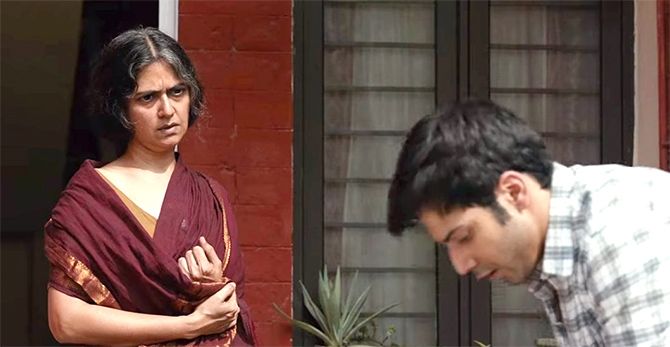Sreehari Nair picks the top performers of 2018.
I don't think the quality of acting in Indian movies has been better than it is now.
You can today go to a movie that doesn't have much to show by way of film-making brilliance, and still get pleasure out of watching an actor transcend the material.
This is a period in Indian cinema of actors pulling movies behind them.
Not surprisingly then, Indian superstars, across industries, across states, have never had it this bad.
And no, it's not just owing to our superstars *not picking good subjects* or them *not selecting good scripts.*
I think the Indian movie-watching audience, today, even the ones who adore the fat cats, are having difficulty relating to an actor who is not just yet another person in a movie frame.
Superstars, by definition, cannot be just another person in a movie frame, and hence their greatest boon may have turned into their biggest curse.
So about the list that will follow, in keeping with the times, these are not the best actresses and actors of 2018, but the best acting performances of the year.
I suppose, there's some grace in putting it that way.
10. Manoj Bajpayee in Love Sonia

One of the recent tragedies of Indian cinema is the frequent casting of Manoj Bajpayee in roles that are excessively 'tender': He seems to be pleading with us to understand him in movie after movie (Aligarh, Gali Guleiyan, Bhonsle etc).
Tabrez Noorani's Love Sonia, however, aims for the exact opposite effect.
This is one of the most soul-shattering films of the year, and part of its horror derives from the moral bankruptcy of Bajpayee's pimp character, Faisal.
Faisal is scary when forceful, but shakes you up when he acts consciously well-behaved.
Bajpayee plays Faisal like an entrepreneur with the vocabulary of a religious head.
While performing orientation of girls new to prostitution, he is also a minister administering the sacraments.
9. Sourabh Shukla in Daas Dev

We are living in an age of great fat Indian actors and Sourabh Shukla, the fattest of them all, is also the greatest of them all.
As Awadesh in Sudhir Mishra's criminally under-watched Daas Dev, Shukla plays a Faustian character -- a politician who, it seems, has made a pact with the Devil, exchanging his idealism for unlimited power.
Awadesh's body movements tell you something about his moral fall.
In one of the most wonderfully underplayed cinematic moments of the year, Awadesh Pratap returns home after a stint at the hospital, warms up his shoulders and fires a gun inside the comforts of his living room.
'Just checking my reflexes,' he coolly muses.
8. Manoj Pahwa in Mulk

What the family calamity at the centre of Mulk brings to the surface, is the story of a life lived without ambition.
Manoj Pahwa's Bilaal is a tragic original because he embodies the most trivial of all sins: Carelessness.
Pahwa plays the character in a way that suggests this carelessness is intricately linked to Bilaal's status as a sweet-souled gentleman.
This is why it hurts so much when he suffers for his carelessness. (Bilaal's son, Shahid, a terrorist, is blown away, and Bilaal is accused of abetting terrorism).
Heartbreaking is a term often tipped out rather casually but heartbreaking it is when Bilaal, now in police custody, sits across a table from his brother, Murad Ali Mohammed (Rishi Kapoor) -- a man not given to carelessness like Bilaal -- and tells him where he had erred with regard to Shahid.
The entire history of the relationship between the two brothers comes alive in that one moment when Pahwa, in a coarse, half-breathing voice says resignedly: "Bhaijaan, it is you who have told me about my own mistakes. If you couldn't spot Shahid's sins, how am I supposed to?"
7. Gitanjali Rao in October

When Banita Sandhu falls off a terrace, what gets cut off midway is our perception of her character, Shiuli.
We spend the rest of Shoojit Sircar's October trying to piece together Shiuli by studying carefully her mother Vidya Iyer (played by Gitanjali Rao).
Rao's masterful performance is, thus, an evocation of two people at once.
Through knowing Vidya Iyer, we discern the font of Shiuli's dignity, her strength, and her wisdom.
There's nothing pre-planned about Gitanjali Rao's approach; no scheme to her emotions.
Patterns emerge on her chin every time she suppresses a tear.
And when she walks into a room to continue an incomplete conversation and finds the room empty, her lips stop moving abruptly.
Throughout October, Rao as Vidya Iyer creates moments for her and us to experience together.
6. Subodh Bhave in Ani... Dr Kashinath Ghanekar

In movies, I believe, there are only two kinds of performances that last.
First, is a performance like Gitanjali Rao's in October -- a performance that's very fine, subtle.
The second kind is like Subodh Bhave's in Ani... Dr Kashinath Ghanekar -- a performance that fills to the edge without spilling over.
Nothing in between, endures.
In the biopic of Marathi theatre legend Kashinath Ghanekar, Subodh Bhave comes on as if he were playing to a full house, but never hams, not for one moment.
Bhave as Kashinath Ghanekar goes beyond just recreating those great stage performances. In a funny sense, he gives us the best renditions of each one of those legendary characters that he touches along the way.
In the process, he applies to film, the ultimate lesson of theatre acting: Of using one's body as one's most trusted instrument.
Bhave acts at the top of his bent throughout Ani...Dr Kashinath Ghanekar, but he never becomes a joke -- not even when he parodies his subject in the reimagining of the famous dance number Gomu Sangatina.
Does he do Ghanekar better than Ghanekar?
I think, yes.
The movie is kind of a hit-and-miss, but this is a remarkable turn.
5. Tabu in Andhadhun

Simi in Andhadhun is a woman who is least comfortable when ordering a sugarless cake at a restaurant, and most comfortable when uttering a line straight of street theatre: 'Bandar Madari ko baand kar bhaag gaye.'
By and by, you realise that she's a lower-middle class woman trying to pass off as a high-society lady.
It would have taken a Tabu to express this 'divided state' of her character: Throughout the film, we watch her natural instincts catching up with her grand bluffs.
The actress smartly lets her 'process' show: If she were any more polished, the character would have been a typical vamp.
The general air about Simi suggests that she would make friends with the shadier lot; and the nervousness about her suggests that these shady friends would turn out to be too much for her to handle.
What an openly twisted female character, this: in a year when, socially, women are being subjected to another kind of Sacred-ization ('She's a woman, so she can do no wrong').
Also, it's not fortuitous perhaps that Simi is an actress searching for her big break.
What awaits her here, courtesy the plot of this movie, is the role of a lifetime!
4. Mrunal Thakur in Love Sonia

Love Sonia's central character is a girl who has to be 'made beautiful' before she can be deflowered; a girl who has to be 'made resourceful' before her will can be slowly tested.
It's a blessing, then, that an intuitive performer like Mrunal Thakur plays Sonia.
The actress doesn't deny Sonia her unconscious knowledge of her own strengths: She doesn't soften the character.
Nor does she make Sonia too 'consciously tough.' (In the hands of a lesser actress, one of the above two fates awaited the character).
Thakur also consummately plays up the contrast between Sonia the village girl's relationship with the natural world (with the soil, milkweeds and sunlight) and her reactions to the heat of metropolises.
In one of the year's great sequences, you watch, through her eyes, the speed and the rude surprises of Mumbai's life-sucking lanes.
I'm one of those who believe that the free-spirited female character is a 'cinematic trope' that conceals more than it reveals (It's a pipe-dream that goes nowhere).
To watch Mrunal Thakur construct Sonia is to watch her inject 'spirit' into a character, who is in constant danger of losing her spirit.
The whole performance is an act of beauty being preserved.
3. Manisha Koirala in Lust Stories

In Dibakar Banerjee's section of Lust Stories, Manisha Koirala goes from being a woman committing adultery, to being an unsatisfied housewife, to being a woman in love with the idea of 'her as powerful' -- all in the space of 20 minutes.
The shocking brilliance of Koirala's vivid performance is that her character is completely free of moral barbarianism: As Reena, she expresses no fixed moral viewpoints, and this way, she lays out the new rules of the mating game.
When she allows her lover (Jaideep Ahlawat as Sudhir) to sit below her eye-level and then crosses her legs, we instinctively comprehend what she was in college (Reena, Sudhir, and Reena's husband, Salman, are friends from college days), and how marriage has blunted her appeal.
We get it: She was once the girl around whom anything could happen; the troublemaker who always got away. She had the gift of life.
Banerjee's film is Reena's story; it's about her attempt to regain lost ground.
And Manisha Koirala seems to be sourcing her character's desires from some place other than the script.
It feels as though the actress is bringing everything she has learned from life, to the part she is playing.
Reena is one of Indian cinema's definitive female characters, fascinating because she works outside all codes.
She may well be an artist who never officially became one; a mystery to misogynists and feminists alike.
2. Gajraj Rao in Badhaai Ho

The cunning of casting Gajraj Rao as an impregnator of his 40-something-old wife is in the fact that Rao's cagey face naturally belies an achievement of this degree: You don't expect the man to turn out a Tomcat.
(It's akin to expecting Warren Beatty to turn out an Impotent).
The exquisiteness, then, of Gajraj Rao's performance is that he sells Jeetender Kaushik's 'potency' under his personal brand of charm.
What Rao gives Kaushik is a total lack of self-absorption: Physically, he makes him an evader; with a gait and shoulders that suggest low risk-taking abilities; comfortably the slowest in a room of five.
There are times when he has to be literally goaded into offering a reaction.
And yet, this willingness to hold himself back imbues Jeetender Kaushik with a wholly unique style.
The character comes together in your head, and by the end, you may feel as though the immobility of Kaushik was a grand ruse.
You see through his deception. That this stingy man was actually saving himself for the big moments: For when he can silently thank his wife; tremble ever so slightly at the sight of his newborn; or explain, in a moment of old-world sexual electricity, with an affection that transcends sex, that 'Tarit' means 'Bijli.'
1. Bhanita Das in Village Rockstars

The 10-year-old Dhunu would play well as a spiritual successor of Dorothy from The Wizard of Oz.
Like Dorothy, Dhunu recognises the incompetence of the adults around her.
So, while she listens attentively to the myths and fables narrated to her by the supposed grown-ups, her magpie-like brain chooses from those fables ones that truly matter to her.
Dhunu's intelligence is, thus, completely her own.
It's an experience to watch young Bhanita Das externalise Dhunu's this intelligence: Through eyes that constantly flutter around in reaction shots. (She makes a character by breaking it.)
In Dhunu, Director Rima Das has crafted one of Indian cinema's most fiercely independent-minded protagonists: A zippy little girl whose dreams of forming her own rock band, whose contempt for old customs, and the remnants of whose past losses, together give her the drive to perform just about any physical act with a great dancer's talent for conveying the 'sublime.'
When Dhunu climbs trees, she's effectively escaping to a better world.
Honourable Mentions: Fahad Faasil in Carbon; Surekha Sikri Rege and Neena Gupta in Badhaai Ho; Sohum Shah in Tumbbad; Harshvardhan Kapoor in Bhavesh Joshi Superhero; Vinayakan in Ee.Ma.Yau.; Masumeh Makhija in 3 Storeys; Ayushhmann Khurrana in Anadhadhun, Nawazuddin Siddiqui in Manto, Rajesh Tailang in Mukkabaaz; Vicky Kaushal in Sanju and Manmarziyaan).










